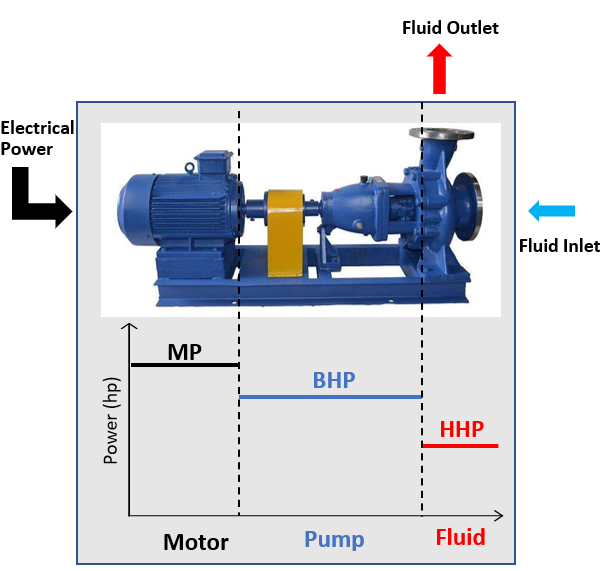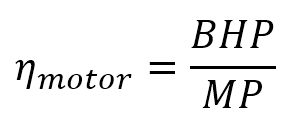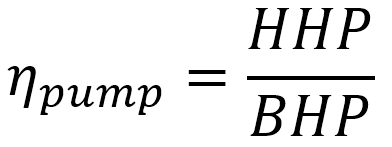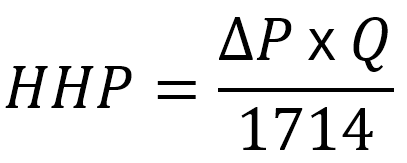Understanding Hydraulic Horsepower, Brake Horsepower, and Pump Efficiency: Key Definitions Explained
In this post, we will break down important terms often associated with pumps—hydraulic horsepower, brake horsepower, pump efficiency, motor power, and motor efficiency. These terms are sometimes confusing or used incorrectly, so we will clarify their definitions and relationships in a pump system.
The diagram below provides a visual guide to help explain each term as we go through this post.

What is Motor Power?
Motor power, represented as MP, is the total power produced by the motor. It is larger than both the brake horsepower and the hydraulic horsepower because some of the motor's power is lost due to inefficiencies like friction.
The total power generated by the motor can be calculated using the following equation:
![]()
(Eqn.1)
Not all of this energy reaches the pump. The portion that does is called brake horsepower (BHP), while the rest is lost due to motor inefficiencies.
Motor Efficiency
Motor efficiency (ηmotor\eta_{motor}ηmotor) is a key metric that shows how effectively a motor transfers power to the pump. It can be expressed as the ratio of brake horsepower to motor power:

(Eqn.2)
This formula shows how much of the motor's energy reaches the pump.
What is Brake Horsepower (BHP)?
Brake horsepower (BHP) is the total power transmitted from the motor to the pump, measured in horsepower (hp). Some of this energy is lost as heat, friction, and inefficiencies in the pump itself, but most of it goes toward moving the fluid, which is described as hydraulic horsepower (HHP).
Brake horsepower can be calculated as:
![]()
(Eqn.3)
Understanding Pump Efficiency
Pump efficiency (ηpump\eta_{pump}ηpump) is the ratio of hydraulic horsepower (the power transferred to the fluid) to brake horsepower (the total power transferred to the pump). Pump efficiency can be expressed as:

(Eqn.4)
This equation shows how much of the pump's power is used to move the fluid versus how much is lost due to inefficiencies in the pump’s operation, such as sealing losses, friction, and leakage.
Hydraulic Horsepower (HHP) and Its Importance
Hydraulic horsepower (HHP) represents the amount of power the pump transmits to the fluid, and it’s also measured in horsepower. To calculate hydraulic horsepower, you multiply the pressure rise across the pump by the volumetric flow rate and then divide by 1714 to convert the units to horsepower. The formula is:

(Eqn.5)
Where:
- Delta P is the pressure rise (psi),
- Qis the volumetric flow rate (gallons per minute).
This equation helps you determine how much power the fluid is actually receiving from the pump.
Conclusion
Understanding the relationships between motor power, brake horsepower, pump efficiency, and hydraulic horsepower is essential when working with pumps. Optimizing these factors can help improve the performance and energy efficiency of your pumping system. By knowing how to calculate and assess each of these metrics, you’ll be better equipped to make informed decisions in pump selection and system design.
For a deeper dive on pumps, check out the Pump Sizing & Modeling Piping Systems For Liquids Course
Receive Free Discounts!
Join our mailing list to receive the latest engineering blogs, tools, resources and discounts on courses.
Don't worry, your information will not be shared.

